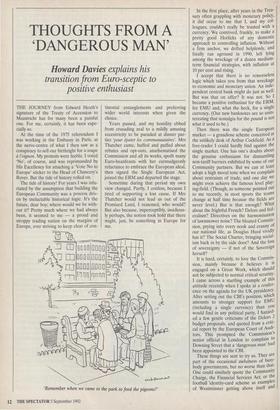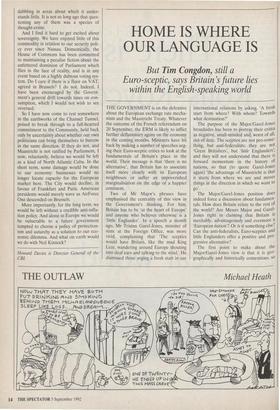THOUGHTS FROM A 'DANGEROUS MAN'
Howard Davies explains his
transition from Euro-sceptic to positive enthusiast
THE JOURNEY from Edward Heath's signature of the Treaty of Accession to Maastricht has for many been a painful one. For me, certainly, it has been espe- cially so.
At the time of the 1975 referendum I was working in the Embassy in Paris, at the nerve-centre of what I then saw as a conspiracy to sell our birthright for a soupe l'oignon. My protests were feeble. I voted 'No', of course, and was reprimanded by His Excellency for attaching a 'Vote No to Europe' sticker to the Head of Chancery's Rover. But the tide of history rolled on.
The tide of history! For years I was infu- riated by the assumption that building the European Community was a process driv- en by ineluctable historical logic. It's the future, dear boy; where would we be with- out it? Pretty much where we had always been, it seemed to me — a proud and stroppy trading nation on the margins of Europe, ever striving to keep clear of con- tinental entanglements and preferring wider world interests when given the choice.
Years passed, and my hostility ebbed from crusading zeal to a mildly amusing eccentricity to be paraded at dinner par- ties 'pour epater les communautaires'. Mrs Thatcher came, huffed and puffed about rebates and opt-outs, anathematised the Commission and all its works, spoilt many Euro-beanfeasts with her curmudgeonly reluctance to embrace the European ideal, then signed the Single European Act, joined the ERM and departed the stage.
Sometime during that period my own view changed. Partly, I confess, because I tired of supporting a lost cause. If Mrs Thatcher would not lead us out of the Promised Land, I reasoned, who would? But also because, imperceptibly, insidious- ly perhaps, the notion took hold that there might, just, be something in Europe for me.
'Remember when we came to the park to feed the pigeons?' In the first place, after years in the Trea- sury often grappling with monetary policy, it did occur to me that I, and my col- leagues, couldn't really be trusted with a currency. We contrived, frankly, to make a pretty good Horlicks of any domestic approach to controlling inflation. Without a firm anchor, we drifted helplessly, and finally ran aground in 1990, left lying among the wreckage of a dozen medium- term financial strategies, with inflation at 10 per cent and rising. I accept that there is no remorseless logic which takes you from that wreckage to economic and monetary union. An inde- pendent central bank might do just as well. But was that on offer? It was not. So became a positive enthusiast for the ERM, for EMU and, what the heck, for a single currency. (Our new banknotes are so unin- teresting that nostalgia for the pound is not what it used to be.)
Then there was the single European market — a grandiose scheme conceived at the unlikely desk of Arthur Cockfield. As a free-trader I could hardly find against the single market. One has one's doubts about the genuine enthusiasm for dismantling non-tariff barriers exhibited by some of our Community partners. But we can at least adopt a high moral tone when we complain about restraints of trade, and one day we might even achieve the famous level play- ing-field. (Though, as someone pointed out to me recently, in most sports the teams change at half time because the fields are never level.) But is that enough? What about the frightful French? Delors and fed- eralism? Directives on the harmonisation of lawnmower noise? The bloated Commis- sion, prying into every nook and cranny of our national life, as Douglas Hurd vividly has it? The Social Charter, bringing social- ism back in by the side door? And the loss of sovereignty — if not of the Sovereign herself?
It is hard, certainly, to love the Commis- sion, mainly because it believes it Is engaged on a Great Work, which should not be subjected to normal critical scrutiny. I came across a startling example of this attitude recently when I spoke at a confer- ence on the agenda for the UK presidency. After setting out the CBI's position, which amounts to stronger support for EMU (including a single currency) than you would find in any political party, I hazard- ed a few gentle criticisms of the Delors 2 budget proposals, and quoted from a criti- cal report by the European Court of Audi- tors. This prompted the Commission s senior official in London to complain to Downing Street that a 'dangerous man' had been appointed to the CBI. These things are sent to try us. They are part of the occasional awfulness of busy- body governments, but no worse than that. One could similarly quote the Community Charge, the Financial Services Act, or the football -identity-card scheme as examples of Westminster getting above itself and
dabbling in areas about which it under- stands little. It is not so long ago that ques- tioning any of them was a species of thought-crime.
And I find it hard to get excited about sovereignty. We have enjoyed little of this commodity in relation to our security poli- cy ever since Nassau. Domestically, the House of Commons has been committed to maintaining a peculiar fiction about the unfettered dominion of Parliament which flies in the face of reality, and is in any event based on a highly dubious voting sys- tem. Do I care if there is a floor on VAT, agreed in Brussels? I do not. Indeed, I have been encouraged by the Govern- ment's general drift towards taxes on con- sumption, which I would not wish to see reversed.
So I have now come to rest somewhere in the earthworks of the Channel Tunnel, poised to break through to a full-hearted commitment to the Community, held back only by uncertainty about whether our own politicians can bring themselves to burrow in the same direction. If they do not, and Maastricht is not ratified by Parliament, I now, reluctantly, believe we would be left as a kind of North Atlantic Cuba. In the short term, some damage would be done to our economy: businesses would no longer locate capacity for the European market here. The City would decline, in favour of Frankfurt and Paris. American presidents would merely wave as AirForce One descended on Brussels.
More importantly, for the long term, we would be left without a credible anti-infla- tion policy. And alone in Europe we would be vulnerable to a future government tempted to choose a policy of protection- ism and autarchy as a solution to our eco- nomic dilemma. And what on earth would we do with Neil Kinnock?
Howard Davies is Director General of the CBI.



















































 Previous page
Previous page